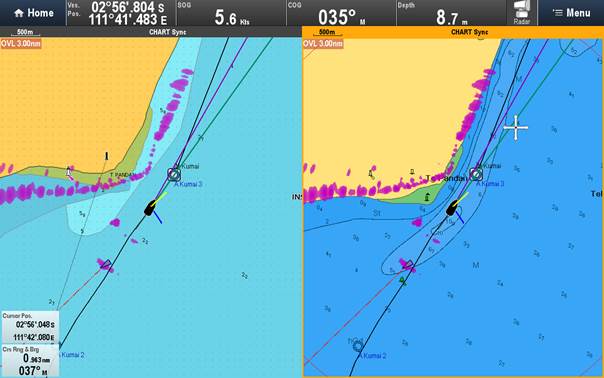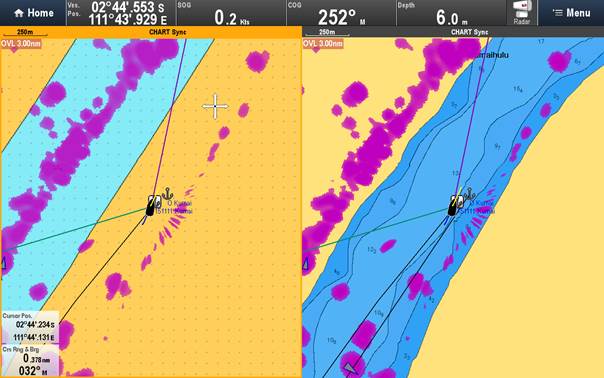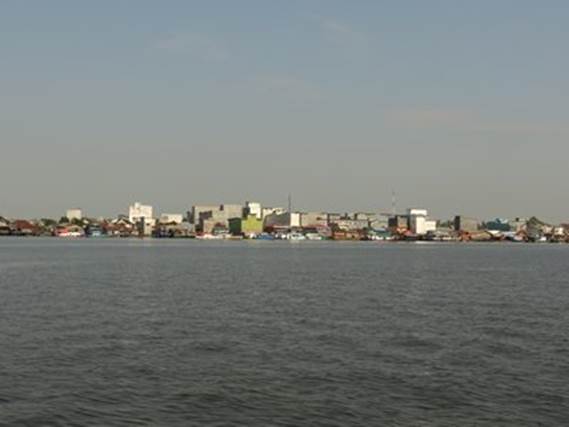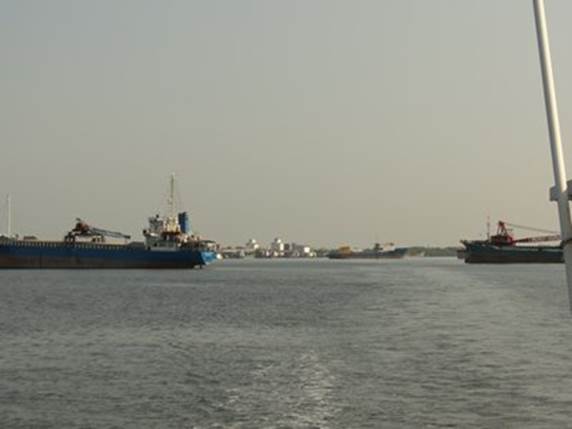Lovina to Kumai Day 3 - Hindsight - entry to Kumai for those who follow

Position 02:44.54 S 111.43.94 E Date 1050 (UTC+8) Thursday 12 November 2015 Distance run In 22hrs 50mins 140nm over the ground, 138nm though the water Trip total 418m over the ground, 418m through the water The aim of this 24 hour period was to close the estuary leading to Kumai for first light so that we could navigate the complications of the estuary and river in daylight. Dodging fishing boats and more tugs and barges in the dark kept the duty watch on their toes as we motored with little or no wind. The quantity of shipping coming out of the Kumai Estuary indicated that the estuary and river could be exciting. As we approached the depth decreased and joy of joys there was enough wind to be able to sail at 5 knots for a few hours. Sailing in 14m and shallowing of water brought back happy memories of the Bahamas. The further into the estuary we sailed the more Bahamas like the depth. A major issue this year has been dense banks of smog caused by the burning off of the rain forest in order to plant palm oil plantations. The smog originated in South Borneo and has been a blight over vast areas of South East Asia. Kumai was particularly badly effected and earlier visitors to Kumai reported visibility down to 50 metres at times. We go off lightly with only occasional whiffs of burning and a general haze. The various sources of navigational advice, pilots and other cruisers all report that of the electronic charts C-Map is way out and Navionics is not much better. Our Raymarine kit now allow us to load both systems and it is interesting to display them side by side with a radar overlay to show where the land actually is; always nice to know.
Navionics on the left and C-Map 4D on the right. The river entrance and between 1.5 (minimum seen) and 3-4 metres under the keel. C-Map seems more accurate with better depth definition. C-Map also recorded buoys which were there but not shown on Navionics The waypoints that we used came from a variety of sources, the sailing vessels Alba and Ocelot and Andy Scott’s Cruising Guide to Indonesia. Alba’s waypoints that we used primarily were: A1 03:11.21S 111:35.49E A2 02:58.12S 111:40.58E A3 02:56.49S 111:41.70E A4 02:54.26S 111:42.58E A5 02:53.62S 111:42.16E A6 02:51.99S 111:43.08E A7 02:50.69S 111:43.65E then C8 02:49.323S 111:43.453E C9 02:48.096S 111:42.148E C10 02:47.150S 111:42.199E And we anchored at 02:44.535S 111:43.940E, which was opposite Kumai Town and generally out of the way of anchored ships, all of which swung with the tide so required watching carefully. In addition there were buoys shown on C-Map. We reckon they have been moved slightly, possibly with the move of the sandbanks. We plotted them from the radar at: Green 1 02:57.507S 111:41.061E Green 2 02:53.368S 111:42.393E Red 1 02:51.869S 111:42.788E There are leading lines but we did not use them, relying on the waypoints for our track. The least depth encountered was 1.5 metres under the keel, i.e. 3.6 metres and we arrived at WP1 at about high tide, so entered against the ebb which we recorded as up to 2 knots. A hazard of the course are fishing nets, some marked with flags or by the presence of their owners and others only spottable at the last moment by a line of small polystyrene floats. We are not sure how they survive passing ships as they seem to be across the channel and the ships certainly do not have the ability to manoeuvre or do emergency stops and handbrake turns that we do.
Fishermen laying nets to catch unwary yachties
Navionics to the left and C-Map 4D on the right, showing our anchor position opposite to the town of Kumai. C-Map in this latest version does appear to have the edge but treat with care In the following photograph the large square buildings without windows are nesting “boxes” for Swifts who provide a harvestable source of bird nests for soup and traditional Chinese treatments. It puts a whole new meaning onto ‘Twitter’ as they play the swift’s calls throughout the day to attract the birds and keep them happy; not much difference really.
Kumai viewed from across the river.
Lots of ships at anchor. It is a busy place and the only reason for our visit was to take a river trip to see the Orangutans of Borneo |




